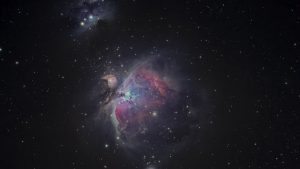Nearly Perfect Einstein Ring 12 Billion Light-Years Away Spotted by NASA’s Webb Space Telescope
NASA’s James Webb Space Telescope has captured a nearly perfect Einstein ring located some 12 billion light-years away. Such rings are the result of the gravitational lensing phenomena. The lensing occurs when the gravitational field from a massive object wraps space and deflects light from a distant galaxy behind it. A Reddit user recently shared a colourised picture of the ring that was captured by the world’s biggest and most powerful space science telescope. The galaxy involved in its formation is called SPT-S J041839-4751.8.To create the picture, Reddit user u/Spaceguy44, an astronomy graduate, processed data captured by Webb’s Mid-Infrared Instrument (MIRI) camera after downloading it from the Mikulski Archive for Space Telescopes (MAST). The rings are formed when the two galaxies are nearly perfectly aligned with each other. The image of the Einstein ring has different filters that result in the colours we see. Red is the F1000W filter, which captures the wavelengths of light at 10µm while green colour is due to the F770W filter that picks up 7.7µm wavelength. Blue colour, meanwhile, is the F560W filter which captures the 5.6µm wavelengths.The user aligned and colourised the images using a process known as Astropy and then further processed them.According to u/Spaceguy44, the galaxy would have not been visible without the gravitational lensing phenomenon. “Without the lensing effect, the galaxy would probably look like most distant galaxies: a small blob of light,” the user wrote.The student explained that one can easily observe the gravitational lensing effect at home using a wine glass. He explained that the stem and the base of the wine glass have optical properties nearly same to that of a massive gravitational lens. Hence, the zooming effect can be observed using the glass. For the latest tech news and reviews, follow Gadgets 360 on Twitter, Facebook, and Google News. For the latest videos on gadgets and tech, subscribe to our YouTube channel. Chor Nikal Ke Bhaga: Netflix Unveils First Look at Yami Gautam, Sunny Kaushal Movie Instagram Precise Location: Viral Posts Spreading Misinformation Lead to Meme-Fest, Company Clarifies

NASA’s James Webb Space Telescope has captured a nearly perfect Einstein ring located some 12 billion light-years away. Such rings are the result of the gravitational lensing phenomena. The lensing occurs when the gravitational field from a massive object wraps space and deflects light from a distant galaxy behind it. A Reddit user recently shared a colourised picture of the ring that was captured by the world’s biggest and most powerful space science telescope. The galaxy involved in its formation is called SPT-S J041839-4751.8.
To create the picture, Reddit user u/Spaceguy44, an astronomy graduate, processed data captured by Webb’s Mid-Infrared Instrument (MIRI) camera after downloading it from the Mikulski Archive for Space Telescopes (MAST). The rings are formed when the two galaxies are nearly perfectly aligned with each other.
The image of the Einstein ring has different filters that result in the colours we see. Red is the F1000W filter, which captures the wavelengths of light at 10µm while green colour is due to the F770W filter that picks up 7.7µm wavelength. Blue colour, meanwhile, is the F560W filter which captures the 5.6µm wavelengths.
The user aligned and colourised the images using a process known as Astropy and then further processed them.
According to u/Spaceguy44, the galaxy would have not been visible without the gravitational lensing phenomenon. “Without the lensing effect, the galaxy would probably look like most distant galaxies: a small blob of light,” the user wrote.
The student explained that one can easily observe the gravitational lensing effect at home using a wine glass. He explained that the stem and the base of the wine glass have optical properties nearly same to that of a massive gravitational lens. Hence, the zooming effect can be observed using the glass.
For the latest tech news and reviews, follow Gadgets 360 on Twitter, Facebook, and Google News. For the latest videos on gadgets and tech, subscribe to our YouTube channel.



